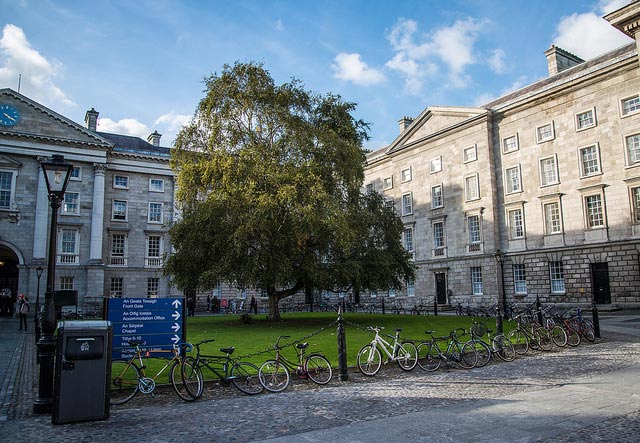Few would argue against the belief that the vast majority of students in any academic institution want their College to adopt the most ethical, just and principled stance as possible on issues of foreign affairs. Why should students expect anything less of Trinity? It is the duty of all of us here in Trinity to support and encourage this university in its activities when it is right, but it is equally our collective obligation to stand up to oppose it when it is unequivocally on the wrong side of history.
Unfortunately, Trinity continues to position itself on the wrong side of history’s dispassionately drawn dividing line when it comes to examining its financial or academic links with Israeli institutions. Only the moderate and reasonable imploration for Trinity to sever these ties and follow the strategy advised by Palestinian civil society of boycotting, divesting and sanctioning Israel, until it ceases to persist in carrying out brutal, inhumane abuses against Palestinian human rights, can transform Trinity into a powerful emblem for peace.
You may be asking yourself: why should a far-off conflict in a far-off land concern me, here in Trinity College Dublin?
The most substantive response that can be offered to such a concern is that we can make a difference. A modest, yet important difference.
Israel relies upon external legitimation, both economic and political, from the international community as a means of acquiring a level of self-assuredness when pursuing its ruinous objectives in Palestine. If we, at Trinity, can be at the forefront of a move to withhold our co-operation and involvement with Israel until it begins to respect the human rights of Palestinians, then we succeed in making those in positions of authority in Israel sit up and take notice of a backlash against its savage policies.
Change is gradual, painstakingly slow and hard won. However, the often excruciating nature of efforts to achieve peace and justice can never be used as a justification for making none.
Change is gradual, painstakingly slow and hard won. However, the often excruciating nature of efforts to achieve peace and justice can never be used as a justification for making none
The wholly unsuitable kind of links Trinity has with Israeli bodies would, on inspection, have the capacity to elicit a dismayed reaction from even the most apathetic of students. They include, or have included, ties with the Israeli Security and Counter-Terrorism academy, Ariel University and the Hebrew University of Jerusalem, which are built partly on illegal settlement lands.
In addition, and perhaps most egregiously, it has been found that Trinity has had ties with the drone manufacturer Elbit Security Systems. Boycotting, divesting and sanctioning Israel offer the only logical, sensible solution to these obscene misjudgements. Only such a campaign can ensure Trinity is no longer tacitly complicit in collaborating with actors in Israel that profit from or help to perpetuate the ugly system of Israeli apartheid, oppression and violence that Palestinian communities suffer under.
Sadly, if Trinity fails to heed the peaceful, dignified call from Palestinian civil society to resist the wicked temptations of commercial gains or otherwise that can be made from these involvements, then we callously turn our backs on the plight of the men, women and children who will live their entire lives with the consequences of the rest of the world’s inaction. We owe it to them to do things in a better way.
The heartening thing for us all to remember is that Trinity has the honour of having set a valiant precedent for itself on the issue of anti-apartheid struggle. Trinity had the rectitude to show solidarity with the victims of apartheid in South Africa by enforcing a similar boycott to the one being urged today by boycott, divest and sanctions activists. Solidarity of this kind is crucial to generating a broader international initiative of opposing regimes that seek to manage systems of apartheid, racism and subjugation.
Solidarity of this kind is crucial to generating a broader international initiative of opposing regimes that seek to manage systems of apartheid, racism and subjugation.
Why does the College administration now see fit to contradict itself, renege on its former pledge to anti-apartheid struggle and let all of us down as a result? Those at the helm of Trinity’s power structure must ask themselves whether the college was right to give a wide berth to despicable regimes of this kind back then. If it was, then why the inconsistency in allying itself with an apartheid regime now?
We must demand consistency from our university on matters as grave and profound as these. We can be proud to say that our campus is home to the symbolically named Mandela House. However, what can this enduring symbol of anti-apartheid sentiment plausibly represent if we are to continue to backtrack on our good record? We stain Mandela’s legendary name with each day that goes by as Trinity neglects to reproach itself and think critically about its links to Israel. Mandela himself had the wisdom to draw an apposite parallel between the condition of his own people and those in Palestine by stating “we know too well that our freedom is incomplete without the freedom of the Palestinians”.
Let us not fold our arms in stony indifference. Let us not condemn ourselves to the hypocrisy of failing to uphold previous high standards in commitments to values of peace, justice and anti-apartheid. Let us begin to think about how best to truly achieve the goal of making Trinity apartheid free once and for all.







